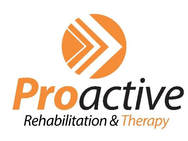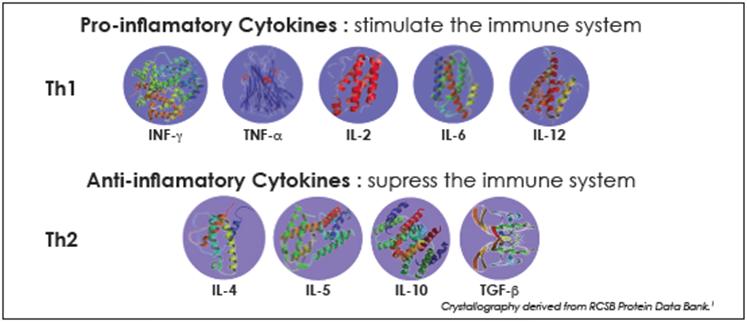Inflammation and the Immune System
Cytokines
Cytokines Cells of the immune system communicate with one another by releasing and responding to chemical messengers called cytokines. These proteins are secreted by immune cells and act on other cells to coordinate appropriate immune responses. Cytokines include a diverse assortment of interleukins, interferons, and growth factors.
Some cytokines are chemical switches that turn certain immune cell types on and off. One cytokine, interleukin 2 (IL-2), triggers the immune system to produce T cells, which may heal diseased tissues in the body.
One group of cytokines chemically attracts specific cell types. These so-called chemokines are released by cells at a site of injury or infection and call other immune cells to the region to help repair the damage or fight off the invader. Chemokines often play a key role in inflammation and are a promising target for new drugs to help regulate immune responses. Some chemokines are considered pro-inflammatory and can be induced during an immune response to recruit cells of the immune system to a site of infection, while others are considered homeostatic and are involved in controlling the migration of cells during normal processes of tissue maintenance or development.
http://www.niaid.nih.gov/topics/immunesystem/immunecells/Pages/cytokines.aspx
Cytokines Cells of the immune system communicate with one another by releasing and responding to chemical messengers called cytokines. These proteins are secreted by immune cells and act on other cells to coordinate appropriate immune responses. Cytokines include a diverse assortment of interleukins, interferons, and growth factors.
Some cytokines are chemical switches that turn certain immune cell types on and off. One cytokine, interleukin 2 (IL-2), triggers the immune system to produce T cells, which may heal diseased tissues in the body.
One group of cytokines chemically attracts specific cell types. These so-called chemokines are released by cells at a site of injury or infection and call other immune cells to the region to help repair the damage or fight off the invader. Chemokines often play a key role in inflammation and are a promising target for new drugs to help regulate immune responses. Some chemokines are considered pro-inflammatory and can be induced during an immune response to recruit cells of the immune system to a site of infection, while others are considered homeostatic and are involved in controlling the migration of cells during normal processes of tissue maintenance or development.
http://www.niaid.nih.gov/topics/immunesystem/immunecells/Pages/cytokines.aspx
Connection Between Oxidative Damage (cell damage) and Autoimmune Diseases
An unhealthy diet can cause damage to the cells in the body overtime that sets the stage for chronic inflammation. Studies point to using avoidance of unhealthy foods and lifestyle choices that produce oxidative stress in the body.
An unhealthy diet can cause damage to the cells in the body overtime that sets the stage for chronic inflammation. Studies point to using avoidance of unhealthy foods and lifestyle choices that produce oxidative stress in the body.
Journal of the American College of Cardiology, Volume 37, Issue 2, February 2001, Pages 485–491Interaction between chemokines and oxidative stress: possible pathogenic role in acute coronary syndromes
http://www.sciencedirect.com/science/article/pii/S0735109700011104
Immunobiology, 2011 Sep;216(9):1010-7. doi: 10.1016/j.imbio.2011.04.001. Epub 2011 Apr 13.
Interaction between oxidative stress and chemokines: possible pathogenic role in systemic lupus erythematosus and rheumatoid arthritis.
http://www.ncbi.nlm.nih.gov/pubmed/21601309
Neurology, February 12, 2013; 80
Correlation between Oxidatives Stress and Chemokines in the Cerebrospinal Fluid of Multiple Sclerosis Patients
http://www.neurology.org/cgi/content/meeting_abstract/80/1_MeetingAbstracts/P03.232
http://www.sciencedirect.com/science/article/pii/S0735109700011104
Immunobiology, 2011 Sep;216(9):1010-7. doi: 10.1016/j.imbio.2011.04.001. Epub 2011 Apr 13.
Interaction between oxidative stress and chemokines: possible pathogenic role in systemic lupus erythematosus and rheumatoid arthritis.
http://www.ncbi.nlm.nih.gov/pubmed/21601309
Neurology, February 12, 2013; 80
Correlation between Oxidatives Stress and Chemokines in the Cerebrospinal Fluid of Multiple Sclerosis Patients
http://www.neurology.org/cgi/content/meeting_abstract/80/1_MeetingAbstracts/P03.232
Interleukin 6
The IL (interleukin)-6-type cytokines are important chemical mediators involved in the regulation of the acute-phase response to injury and infection. Acute IL-6 synthesis provides a warning signal and protects the host from environmental stress. Its prolonged production, however, causes the onset and progression of various autoimmune diseases.
The IL (interleukin)-6-type cytokines are important chemical mediators involved in the regulation of the acute-phase response to injury and infection. Acute IL-6 synthesis provides a warning signal and protects the host from environmental stress. Its prolonged production, however, causes the onset and progression of various autoimmune diseases.
Biochem J. 2003 Aug 15;374(Pt 1):1-20.
Principles of interleukin (IL)-6-type cytokine signalling and its regulation.
http://www.ncbi.nlm.nih.gov/pubmed/12773095
International Journal of Rheumatology, Volume 2012 (2012), Article ID 946048, 14 pages
Tocilizumab for the Treatment of Rheumatoid Arthritis and Other Systemic Autoimmune Diseases: Current Perspectives and Future Directions
http://www.hindawi.com/journals/ijr/2012/946048/
Principles of interleukin (IL)-6-type cytokine signalling and its regulation.
http://www.ncbi.nlm.nih.gov/pubmed/12773095
International Journal of Rheumatology, Volume 2012 (2012), Article ID 946048, 14 pages
Tocilizumab for the Treatment of Rheumatoid Arthritis and Other Systemic Autoimmune Diseases: Current Perspectives and Future Directions
http://www.hindawi.com/journals/ijr/2012/946048/
Prostaglandins
Hormone-like substances that participate in a wide range of body functions such as the contraction and relaxation of smooth muscle, the dilation and constriction of blood vessels, control of blood pressure, and modulation of inflammation. Prostaglandins are derived from a chemical called arachidonic acid.
http://www.ncbi.nlm.nih.gov/pmc/articles/PMC3081099/
Hormone-like substances that participate in a wide range of body functions such as the contraction and relaxation of smooth muscle, the dilation and constriction of blood vessels, control of blood pressure, and modulation of inflammation. Prostaglandins are derived from a chemical called arachidonic acid.
http://www.ncbi.nlm.nih.gov/pmc/articles/PMC3081099/
Attack Cells of the Immune System
T lymphocyte killer cells
These are the immune cells that attack foreign cells such as bacteria, viruses, parasites, or yeasts.
B lymphocyte antibody cells
B cells produce antibodies, which attack and destroy specific foreigners.
Control Cells of the Immune System
T Helper Cells
These accelerate the immune response producing more inflammation. They have specific roles such as controlling the intensity of the attacking T and B lymphocyte cells.
T Regulator Cells
These turn off the immune response and inflammation. These cells play an important role in autoimmune disease recovery.
T lymphocyte killer cells
These are the immune cells that attack foreign cells such as bacteria, viruses, parasites, or yeasts.
B lymphocyte antibody cells
B cells produce antibodies, which attack and destroy specific foreigners.
Control Cells of the Immune System
T Helper Cells
These accelerate the immune response producing more inflammation. They have specific roles such as controlling the intensity of the attacking T and B lymphocyte cells.
T Regulator Cells
These turn off the immune response and inflammation. These cells play an important role in autoimmune disease recovery.
Immunosuppression
The depletion of dividing T cells leads to immunosuppression. This could be the result of an immunotherapy to control the reactivity of the T cells involved in immune responses (autoimmunity, inflammatory diseases), or the consequences of anti-tumour chemotherapy targeting dividing tumour cells.
http://cdn.intechopen.com/pdfs-wm/29070.pdf
The depletion of dividing T cells leads to immunosuppression. This could be the result of an immunotherapy to control the reactivity of the T cells involved in immune responses (autoimmunity, inflammatory diseases), or the consequences of anti-tumour chemotherapy targeting dividing tumour cells.
http://cdn.intechopen.com/pdfs-wm/29070.pdf

